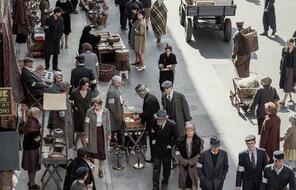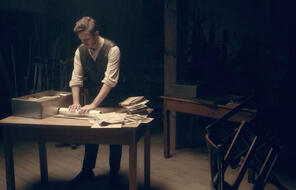Opportunism during Kristallnacht
At a Glance
Subject
- History
- The Holocaust
Despite Gestapo chief Heinrich Müller’s instructions to state police that plundering be held to a minimum (see reading, The Night of the Pogrom), the theft of goods, property, and money from Jews by German police, SS members, and civilians amid the chaos of Kristallnacht was widespread.
German newspapers reported the looting of and theft from Jewish-owned businesses. According to Berlin’s Daily Herald newspaper, “The great shopping centers looked as though they had suffered an air raid . . . Showcases were torn from the walls, furniture broken, electric signs smashed to fragments.” The News Chronicle newspaper, also from Berlin, reported looters “smashing with peculiar care the windows of jewellery shops and, sniggering, stuffing into their pockets the trinkets and necklaces that fell on the pavements.” 1
In Vienna, Helga Milberg, who was eight years old during Kristallnacht, recalled that all of the goods and equipment from her father’s butcher shop were stolen during the pogrom. “My father saw that the other storekeepers had helped themselves to everything,” she wrote. 2 According to historian Martin Gilbert, when a British reporter asked a Nazi official about the widespread theft of goods from Jewish businesses during Kristallnacht in Vienna, the official responded:
“We began seizing goods from Jewish shops because sooner or later they would have been nationalised [confiscated by the government] anyway.” The goods thus seized, the official added, “will be used to compensate us for at least part of the damage which the Jews have been doing for years to the German people.” 3
Gilbert also describes how Kurt Füchsl’s family lost their home.
Seven-year-old Kurt Füchsl was bewildered by the events of Kristallnacht, and by being forced to leave home with his family early on the morning of November 10. He later recalled: “What happened, as recounted to me by my Mother, was that an interior decorator had taken a picture of our beautiful living room and displayed the picture of our apartment in his shop window. A Frau [Mrs.] Januba saw the picture and heard that we were Jewish. She came around to the apartment and asked if it was for sale. She was told it wasn’t, but a few days later, on the morning of Kristallnacht, she came back with some officers and said, ‘This apartment is now mine.’ She showed a piece of paper with a swastika stamped on it and told us that we would have to leave by six that evening.” Kurt Füchsl’s mother protested to the officers who were accompanying Frau Januba that she had a sick child at home who was already asleep. “All right,” they told her, “but you have to get out by six in the morning.” 4
German officials also stole cash from Jewish businesses and families. Two weeks after Kristallnacht, Margarete Drexler wrote the following letter to the Gestapo, requesting the return of the money officials had taken from her home in Mannheim, Germany:
Mannheim, 24 November 1938
Margarete Drexler, Landau Pfalz Suedring St. 10To the Secret State Police Landau (Pfalz) The sum of 900 Marks in cash was confiscated from me in the course of the action of 10 November. I herewith request to act for the return of my money, as I need it urgently for me and my child's livelihood. I hope that my request will be granted, as my husband died as a result of his injuries during the war — he fought and died for his fatherland with extreme courage — and I am left without any income. Until recent years you could have found a photo of my husband on the wall next to the picture of Generalfeldmarschall [Paul] von Hindenburg in the canteen of the 23 Infantry regiment in Landau. This was done to honour his high military performance. His medals and decorations prove that he fought with great courage and honour. He received: The Iron Cross First Class, The Iron Cross Second Class, The Military Order of Merit Fourth Class with swords. The Military Order of Sanitation 2 class with a blue-white ribbon. This ribbon is usually bestowed only upon recipients of the Max Joseph Order, which accepts only members of the nobility. I can only hope that as a widow of such a man, so honoured by his country, my request for the return of my property will not be in vain.
With German greetings,
(signed) Frau Margarete Drexler
Widow of reserve staff surgeon
Dr. Hermann Drexler 5
In 1940, Drexler was arrested and imprisoned in a concentration camp in France, where she died.
Connection Questions
- How did the chaos of Kristallnacht present opportunities for German officers and civilians to take property from Jews? Why did they defy orders not to plunder?
- Why do you think Margarete Drexler described her husband’s military service and honors when she requested that the Gestapo return her money?
- Why might incidents of chaos and violence lead people to make impulsive and even illegal decisions? Have you heard of more recent instances of plundering and disregard for property during periods of violence and unrest?
- 1Martin Gilbert, Kristallnacht: Prelude to Destruction (New York: HarperCollins, 2006), 46–47.
- 2Martin Gilbert, Kristallnacht: Prelude to Destruction (New York: HarperCollins, 2006), 54.
- 3Martin Gilbert, Kristallnacht: Prelude to Destruction (New York: HarperCollins, 2006), 59.
- 4Martin Gilbert, Kristallnacht: Prelude to Destruction (New York: HarperCollins, 2006), 62.
- 5Yad Vashem, “Looting during ‘Crystal Night,’” accessed June 29, 2016.
How to Cite This Reading
Facing History & Ourselves, "Opportunism during Kristallnacht," last updated August 2, 2016.








